| Srl | Item |
| 1 |
ID:
076497
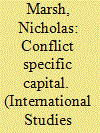

|
|
|
|
|
| Publication |
2007.
|
| Summary/Abstract |
This article presents a correspondence between the mode of weapons acquisition by armed opposition groups and the form of a civil war. The mode of arms acquisition is affected by two factors-availability and control over the acquisition process. Variations in the mode of arms acquisition correspond to three types of insurgency: led by a single and organized group, warlordism, and disorganized armed bands. This article discusses how weapons acquisition is considered in the existing literature on arms and civil conflict, and examines the definitions of arms availability. It provides new insights on the availability and control of weapons in civil conflict and provides examples from Nepal, Iraq, and Afghanistan. The article concludes with an examination of the policy implications of its findings.
|
|
|
|
|
|
|
|
|
|
|
|
|
|
|
|
| 2 |
ID:
076496
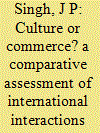

|
|
|
|
|
| Publication |
2007.
|
| Summary/Abstract |
Does international trade in cultural products threaten cultural diversity in the developing world? This article seeks to question the implied correlation by exploring the intellectual and empirical bases of the claims. Conceptually, I argue that cultural diversity viewed from the perspective of the nation-state is problematic. Politically, of course, nation-states make this claim themselves in protecting their self-interest globally. Empirically, this paper shows that nation-states at the forefront of the movement protecting cultural diversity are, in fact, top exporters of cultural products, something that is not apparent in the mercantilist position taken by these states with respect to international trade in cultural products. The paper then explores the position of developing countries explicitly taking advantage of globalization of culture to promote both their cultural distinctiveness as well as their exports. These "cultural voices," I conclude, are growing economically and socially and cannot be dismissed as playing second fiddle to those from the developed world.
|
|
|
|
|
|
|
|
|
|
|
|
|
|
|
|
| 3 |
ID:
076503
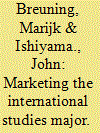

|
|
|
| 4 |
ID:
076498
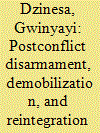

|
|
|
|
|
| Publication |
2007.
|
| Summary/Abstract |
Postconflict disarmament, demobilization, and reintegration (DDR) of former combatants in Angola, Mozambique, Namibia, South Africa, and Zimbabwe aimed at addressing problems of postconflict peace building. Differences among designs and designers of these subregional postconflict cases are well known. An overarching goal was the pursuit of peace and stability through the management of weapons and sustainable reintegration of ex-combatants. In all the different cases, DDR fell short of meeting this target with different impacts. Through an integrative focus sensitive to policy and context, this article draws on these shortcomings to contribute to this rapidly growing and internationally recognized important subfield of international relations.
|
|
|
|
|
|
|
|
|
|
|
|
|
|
|
|
| 5 |
ID:
076493


|
|
|
|
|
| Publication |
2007.
|
| Summary/Abstract |
This article argues that there are two justifications of the right of national defense. First, some states possess the right as a means of protecting legitimate domestic political institutions. Second, all states possess the right within a morally defensible form of international law. Critics have argued that the first justification does not explain why one legitimate state should have the right not to be attacked and conquered by another legitimate state. Critics have argued that the second justification does not recognize that current international law is too flawed to justify a right of national defense for all states. This article defends the right against both criticisms. It then considers the scope of the right, focusing on the issue of proportionality. The article also argues that the two justifications of the right express potentially conflicting principles of justice, which can sometimes lead to hard choices, as illustrated by the NATO intervention in Kosovo.
|
|
|
|
|
|
|
|
|
|
|
|
|
|
|
|
| 6 |
ID:
076500
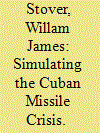

|
|
|
|
|
| Publication |
2007.
|
| Summary/Abstract |
The Cold War is now ancient history to most university students. They can learn the facts of this period, but the feelings associated with the experience are beyond the scope of social science. Such feelings should be part of teaching and learning about international studies. Instructors can present history and politics, but without an emotional sense of empathy, students will never fully understand the subtle complexity of international affairs. They must be able to view the world from different perspectives, participating in the values, feelings, and perceptions of others. This study describes a computer simulation that allows students to participate in the emotional affect of the Cold War, developing a sense of empathy with decision makers. Part one presents a literature survey and discusses the need for control groups and research replication. Part two describes the simulation. Part three evaluates the results on student learning. A conclusion introduces a means by which instructors can replicate the simulation experience.
|
|
|
|
|
|
|
|
|
|
|
|
|
|
|
|
| 7 |
ID:
076495


|
|
|